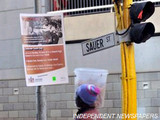
This June, we will once again commemorate the student uprising of 1976. In our public discussions, we will try to extrapolate lessons to tell a new generation how to follow the students’ example in their fight for freedom.
These discussions are likely to be filled with platitudes telling today’s youth that they must do things for themselves and not get involved in such ills as drugs, crime and teen pregnancy.
But there is something empty and dishonest about the way we keep preaching to today’s youth about 1976.
For one, it is quite clear that the context has changed. We have a democratically elected government and the political terrain has shifted hugely.
Second, not only have the structures of our economy barely changed, South Africa has been reintegrated into the world economy in ways that force us to deal with inherited inequality in a context of more competitive terms of global trade.
Third, and most importantly, there is hardly a mention of the fact that much of the anger of 1976 was also directed at the older black generation.
The youth of 1976 were protesting not just against apartheid as a system of white domination, but also against their parents and elders, who they felt had become pacified and accustomed to the destructive system.
In the initial stages of the uprising, government-run beerhalls in townships where fathers drank away their meagre wages were the targets of the students’ anger.
Yet today, we have erased this internal community dimension driving the 1976 students. Therefore we celebrate a narrow conception of 1976 politics as one of anger against a white system, while conveniently forgetting their anger at the perceived failure of moral and political leadership by the older black generation.
Indeed, I have yet to hear a public figure or government leader implore young people to rebel like the 1976ers if black leadership fails them.
I can only surmise that this is an uncomfortable aspect of June 16 to remember. After all, many of today’s leaders and parents, the adults in charge today, were part of the student and youth activism scene of the 1970s. They know first-hand how youth anger can shake a country.
It is easier to say “We were great in our younger days, follow our lead”, than to say “We now hold the levers of power, question us as we questioned our elders”.
One perplexing example of how the adults are failing is the woeful performance of our education system.
At both the parental and government level, it is clear that the adults in charge have neither sufficient political will nor the imagination to reconstruct the legacy of HF Verwoerd.
Black parents should be up in arms about the fact that their children are subject to such appalling learning and teaching conditions in schools.
However, unless there is an obvious crisis, most black parents resign themselves to sending their children to badly run schools every day.
At the level of government, the ANC has had 20 years to advance a considerable overhaul of the education system. Instead, the governing party has been hampered by a combination of policy mania and internal alliance politics.
It is no secret that there is reluctance to tackle the damaging politics of the South African Democratic Teachers Union (Sadtu) in our schools. In fact, to even point this out is to invite vicious attack, even though it is as clear as daylight that the cosy position of Sadtu in the alliance hampers progress. Thus instead of reversing Verwoerd’s legacy, the adults in charge have reproduced mechanisms that result in black semi-literacy!
Add to these woes the current reality that many young people face the tragic prospect that they may never be able to earn a steady income in their lifetime, a harsh condition of global capitalism that the previous generation never faced. While they are coming to terms with poor education and joblessness, young people today also watch how the adults in charge do well for themselves in government and business.
How for example, can any liberation movement in government justify spending R200 million of public funds on a president’s private residence? Where is the sense of social sensitivity, never mind the fiscal prudence, when such decisions are made?
Furthermore, young people today watch the enrichment of a small segment of young blacks through political networking while others who received “Model C” and private school education get absorbed into white middle-income society and the economy.
In the face of all these contradictions and disjuncture, every June 16 we patronisingly play the game of rhetoric, passing on trite self-help motivational advice to young people as though they have special powers to overcome the problems of their society.
We preach to them the “Do It Yourself” message when they know that the successes of the better-off segments were the result of sustained access to functional education institutions and privileged social networks.
This preaching is disingenuous, a brazen mockery of young people’s intelligence.
If we are serious about black freedom, then let us be serious!
First, youth must reject comparisons to 1976 that play down the duty of youth to question their seniors where they fail us. The older generation can choose to hide their heads in the sand or face their obvious shortcomings.
Second, there is a deeper philosophical problem of freedom black people must face. We cannot continue to see freedom through the lens of a grand struggle fought by once valiant heroes.
Freedom is a cross-generational project for which young and old are responsible, building a legacy from one generation to the next.
Young and old have to imagine how to reconstruct from the ashes of the old, a new society and culture in which future generations will thrive.
Caption: There is something empty and dishonest about the way we preach to todays youth about 1976, says the writer.
Photo by: Bongiwe Mchunu
By: Nomalanga Mkhize
Mkhize lectures history at Rhodes University.
Source: Sunday Independent
